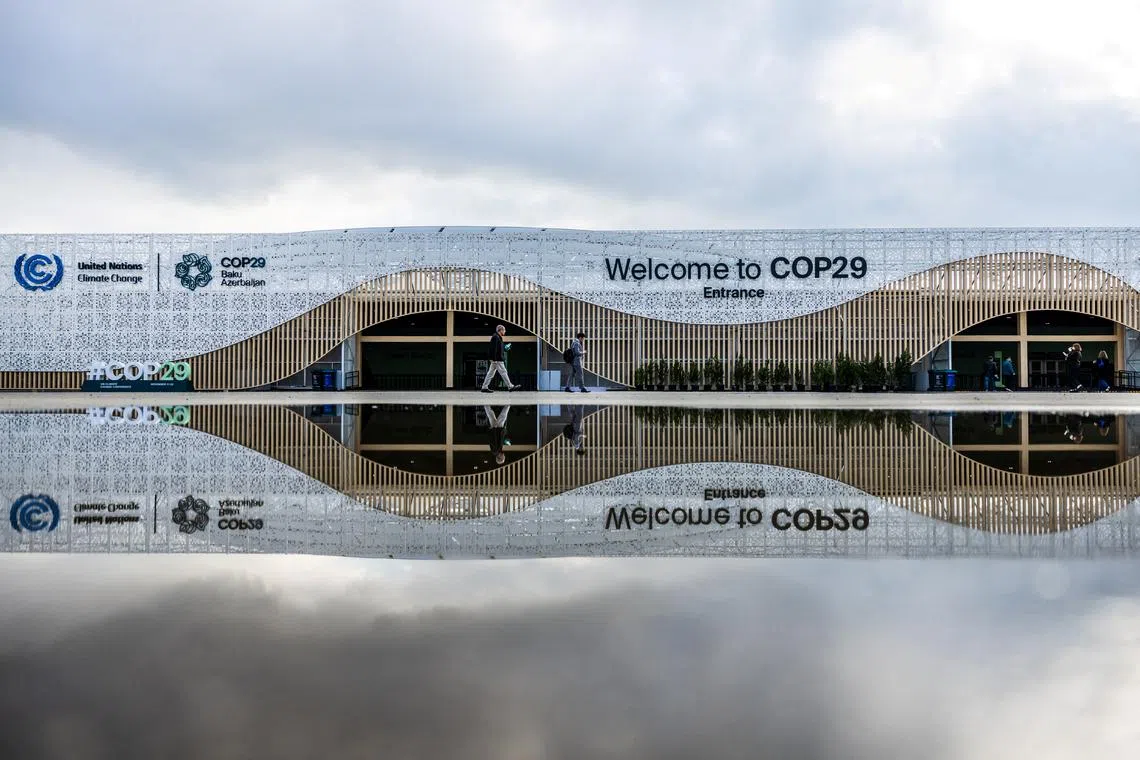Trump and trade worries cloud COP29 climate summit in Baku
Sign up now: Get ST's newsletters delivered to your inbox

Azerbaijan capital Baku faces pressure to show progress from 2023’s COP28 pledge to transition away from fossil fuels.
PHOTO: REUTERS
BAKU – The annual UN climate summit began on Nov 11 with some prominent leaders planning to skip the event ahead of tough talks on finance and trade, after a year of weather disasters that has emboldened developing countries’ demands for cash.
Delegates gathering in Baku, capital of Azerbaijan, hope to resolve the COP29 summit’s top agenda item – a deal for up to US$1 trillion (S$1.33 trillion) in annual climate finance for developing countries, replacing a target of US$100 billion.
“Let’s dispense with the idea that climate finance is charity,” UN climate chief Simon Stiell said at the Baku Stadium venue. “An ambitious new climate finance goal is entirely in the self-interest of every nation, including the largest and wealthiest.”
But the financing goal is competing for attention with economic concerns, wars in Ukraine and Gaza and the election of Donald Trump,
Political leaders expected to stay away include US President Joe Biden, Chinese President Xi Jinping and European Commission president Ursula von der Leyen.
The Caspian Sea nation, which prides itself on being home to the world’s first oil wells, faces pressure to show progress from 2023’s COP28 pledge to transition away from fossil fuels
Azerbaijan’s oil and gas revenues accounted for 35 per cent of its economy in 2023, down from 50 per cent two years earlier. The government says these revenues will decline further, to 22 per cent by 2028.
One of the first tasks, as the summit talks began, was to adapt the agenda to accommodate China’s last-minute proposal to discuss trade.
The Chinese proposal – made on behalf of the “Basic” group of countries, including Brazil, India and South Africa – asked for the summit to address “restrictive trade measures” such as the European Union’s carbon border tariffs
Those concerns have been compounded by Trump’s campaign promise to impose 20 per cent tariffs on all foreign goods and 60 per cent on Chinese goods
China’s request showed it flexing its muscles after Trump’s election, which signalled the US’ likely disengagement from global climate cooperation, said Mr Li Shuo, director of China Climate Hub at the Asia Society Policy Institute.
Trump has called climate change a hoax and vowed to withdraw the US from the Paris Agreement,
Mr Michai Robertson, finance negotiator for the Alliance of Small Island States, told Reuters that the impact this time could be greater given more countries were “leaning right” politically.
“The ball is back in the court of the developed countries and their populations: You all need to get your act together, or we... will suffer because of your negligence,” he said.
Despite the Trump concerns, the US, under the outgoing Biden administration, delivered an early statement of positive climate intent with a world-first deal to guarantee some of the Asian Development Bank’s loans.
Extreme weather
The period from 2015 to 2024 will be the warmest decade ever recorded, the UN’s World Meteorological Organisation (WMO) said in a new report based on six international datasets, AFP reported.
WMO chief Celeste Saulo said she was sounding the “red alert”. “It’s another SOS for the planet,” she told reporters in Baku.
“The ambitions of the Paris Agreement are in great peril,” the climate and weather agency said.
2024 is on track to be the hottest on record and experts said climate extremes – from flooding disasters in Africa, coastal Spain and the US state of North Carolina, to drought gripping South America, Mexico and the US west – were challenging rich and poor countries alike.
Most countries are not prepared.
Mr Kaveh Guilanpour, vice-president for international strategies at the non-profit Centre for Climate and Energy Solutions, said: “Unless the world collectively steps up its efforts, the impacts of climate change will become increasingly severe and frequent and will be felt by an increasing number of people in all countries, including in the US.”
Many people gathered in Baku worry that US disengagement could lead other countries to backpedal on past climate pledges or scale back future ambitions.
“People will be saying, well, the US is the second-biggest emitter. It’s the biggest economy in the world... If they don’t set themselves an ambitious target, why would we?” Mr Marc Vanheukelen, the EU’s climate ambassador from 2019 to 2023, told Reuters.
Azerbaijan has been lobbying governments to accelerate their move to clean energy while touting gas as a transition fuel.
President Ilham Aliyev has called Azerbaijan’s fossil-fuel bounty “a gift of God”, and Baku has proposed creating a Climate Finance Action Fund to collect up to US$1 billion voluntarily from extractive companies across 10 countries, including Azerbaijan.
Azerbaijan’s gas exports to Europe in 2024 are expected to exceed 12 billion cubic m after 11.8 billion cubic m in 2023, as Europe seeks to reduce its reliance on Russian gas.
Presidential aide Hikmet Hajiyev said that with its build-up of renewables, Azerbaijan was “moving from fossil fuel exports to green electricity exports”. Baku aims to have renewable energy fuelling 35 per cent of its power plant capacity by 2030. In 2023, this figure was about 20 per cent.
Azerbaijan has drawn international criticism for jailing political prisoners, including journalists and ethnic Armenians whom Baku describes as separatist leaders.
Mr Aliyev has rejected the criticism and said it could undermine peace negotiations with Armenia.
More than 51,000 people are expected at the talks. REUTERS


